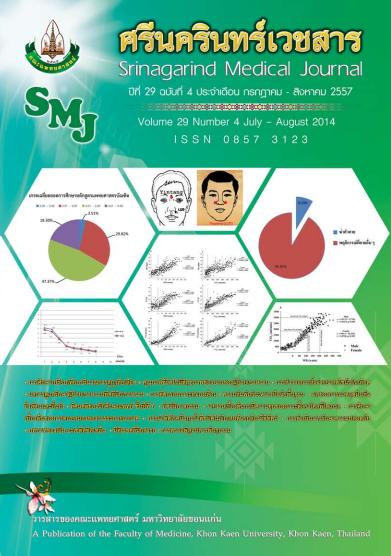The Effect of Nasal Massage of the “Yingxiang” and “Yintang” Acupuncture Points to Nasal Congestion Symptom in Patients with Allergic Rhinitis
บทคัดย่อ
Background and objective: The usage of medications to relief nasal congestion may cause side effect and make a cost. If the massage of the acupuncture point provides relief from nasal congestion, then this simple technique would make a good alternative to pharmaceutical intervention. This study aim to determine the effect of nasal massage of the “yingxiang” and “yintang” acupuncture points in patients with nasal congestion associated with allergic rhinitis.
Methods: A randomized control trial study was performed at Kalasin hospital in patients with nasal congestion associated with allergic rhinitis. They were randomized divided into two groups; one group self massaged the yingxiang and yintang points while the other group acted as control group without massage. Nasal congestion score and nasal secretion score were measured at baseline and 1 week later. The data was analyzed by Wilcoxon signed-rank test to compare scores within the groups. The data was analyzed by Mann-Whitney U test to compare scores between both groups. A p value of < 0.05 was considered significant.
Results: Of 105 patients [mean (range) age, 38 (15-68) years; 63.8% female], 54 were randomly assigned to massage acupuncture point group and 51 were assigned to control group. After treatment, mean nasal congestion score and mean nasal secretion score are improved from baseline in both groups with statistically significant different (p=0.00). There was statistically significant difference between massage group and control group to improve nasal congestion score (p=0.00). There was no statistically significant difference between massage group and control group to improve nasal secretion score (p=0.52).
Conclusion: Nasal massage of the “yingxiang” and “yintang” acupuncture points can relief nasal congestion and may relief some nasal secretion. Further studies using both subjective and objective measures of outcomes are recommended.




